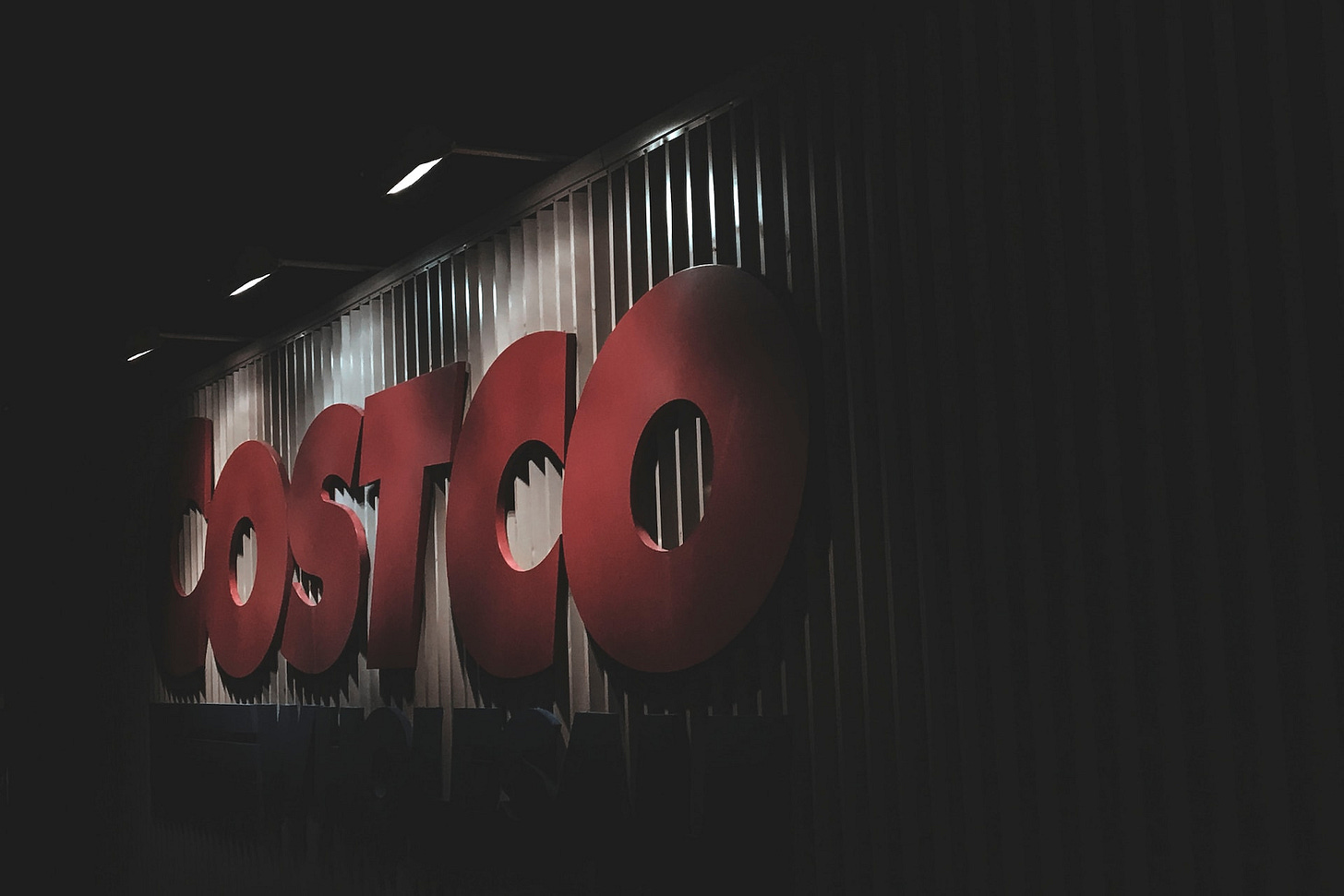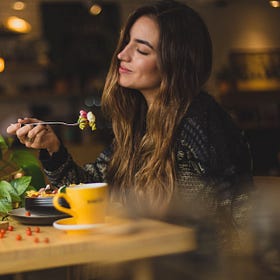
CW: this essay includes a brief reference to childhood trauma and its possible link to compulsive exercise, so please skip it if those topics are sensitive for you.
When I started looking around for more freelance writing opportunities, I quickly realized I could fill my days writing countless versions of "5 Things You Should Always Buy at Costco, According to a Dietitian" if I wanted to.1 I've written my share of fluffy clickbait content, so no shade to anyone who makes a living writing about "The #1 Thing Dietitians Do Before Eating an Apple,"2 but that is not my chosen path.
There is a sadness to our insatiable need for "experts" to tell us what to eat and how to live. To me it reveals a hollowness that in other cultures is filled with the solid reassurance of a cultural cuisine whose shared practices provide norms and rules that can't be dislodged by any old TikTok influencer or doctor who wants to write a bestselling book. Without that solid center, we are lost; we just want someone to tell us what to do in 10 simple steps.
I have been researching food and nutrition practices during the Progressive Era (1890s-1920s) for another piece I'm writing, and learning about the birth of nutrition "experts" during this time. It wasn't until we had an understanding of calories, or knew of the existence of vitamins, that such expertise even became possible. Many people at the time were unhappy with the shift, as Helen Zoe Veit writes in Modern Food, Moral Food: Self-Control, Science, and the Rise of Modern American Eating in the Early Twentieth Century:
Only a few years before, a woman who could produce appetizing food within the family budget was considered a great success as a cook, but increasingly women who were already stretched thin also felt pressured to calculate things like protein, fiber, calories, and vitamins. As a woman named Mary Gallery pleaded to [U.S. Food Administration head Herbert] Hoover from Chicago, "Do call off the scientific crowd — getting awful sick of caloric and percentage of protein at every meal!"
Same, Mary. Same.
More on the relentless pressures of cooking for a family:
Food Security Is Good. But Who Provides Meal Security?
In 2013, Michael Pollan's book Cooked came out. Its basic premise is that cooking is an act of empowerment for the average person, and a small way to fight against the corporate takeover of our foodways. In 2013, this sounded about right to me. I had no children and not a lot of money, but I usually had time to cook—a…
This weekend I read an interview with Dr. Peter Attia, who wrote a best-selling book about longevity, and who personally works out for two-plus hours a day in order to lengthen his life. His entire outlook saddens me, and embodies all the worst aspects of self-optimization culture, which is rooted in those early days of nutrition science and euthenics. The interviewer asked him:
I can’t help wondering if your methods have an element of robbing Peter to pay Paul. If I decide to exercise two hours a day, become hyperfocused on well-being, get very particular about what I eat, in the hope that I’ll be healthier and have more quality time to spend when I’m older — but I could be using that time now! Why give away all this time and energy when I’m still relatively young and healthy? Do you not see any tension or contradiction there?
I see it as an optimization problem. I’ll give you a personal example that happened today: My son in kindergarten had a thing at school. Parents come in, and from 9 to 9:30 the kids are going to read you the story that they wrote. This poses a challenge for my schedule…[s]o I had a choice to make, which was I could have punted on going to my son’s thing and got my full workout in, or I could have squeaked in a 45-minute workout, then gone to the dermatologist. I thought about this for two nanoseconds, and it was clear what the right thing was: I’m not going to miss this school thing, because that’s not the dad I want to be. That’s costing me a little in terms of fitness. Today was supposed to be a killer day: squats and dead lifts. It didn’t happen. I didn’t do my blood-flow restrictions. I missed stuff that I wanted to do, but that’s the trade-off I wanted to make. We have to think about those things constantly.
I guess I am happy to know time with his son takes precedence over multiple hours of "blood-flow restrictions." But reading the full interview, I am particularly struck by the interviewer's theory that the abuse Attia experienced as a child was "a deeply scarring, formative loss of control…and you’ve since been compelled to carve out a life of total control, especially over your own body." Attia says he has never considered it before.
To me, this kind of relentless pressure to optimize every aspect of your life is a sign of not being well, not a set of behaviors to emulate. That we are so desperate to emulate someone like this is a sign that collectively, we are not well either.3 We point to the scientific evidence behind such behaviors, as if science does not have its own biases, and as if laboratory-controlled studies are an accurate representation of how we should live our lives.
Early home economists aligned themselves with science because it was a way to be taken seriously, Helen Zoe Veit writes in Moral Food, Modern Food.
The tone of domestic science advice could be moralizing, classist, xenophobic, and self-righteous. The advice could also sound controlling, sometimes to a seemingly irrational extent, like commands that food should never be highly seasoned, or that children should be taught never to comment on food, or that bowel movements should take place only before or after breakfast.
The majority of dietitians I know don't think in never or always. But we can't sell nuance in the same way, not when what people crave is rules and certainty, and so we are pressured into publicly prescribing absolutes.
I loved this recent Q & A from
on , in which she tackles the extremely common question: What should I do about my fussy-eating child? She doesn't respond with The Answer From an Expert because it is impossible to provide a blanket answer to this kind of challenge. Instead she responds with the kinds of questions she would ask a client, affirmations around what is to be expected when we're feeding young kids, and a list of signs that it may be time to seek outside help. It's not a simple answer, but it is infinitely more useful than if she had provided One Answer to Rule Them All.One aspect of Substack that I very much appreciate is that we can make space for that nuance, supported by readers who are here for the depth, not the drive-by click. It's one way to escape the cycle of absolutes, even as the tide of nutrition "experts" on TikTok threatens to flood the whole building.
Tell me: who do you think is bringing nuance to the nutrition and wellness conversation? And also feel free to share your Costco faves in the comments! (No credential required.)
More on nuance in nutrition:
Intuitive Eating Is Not for Everyone
My friend Melissa Gallanter is a registered dietitian in New York City, working with clients who are food insecure and living with HIV/AIDS, many of whom are BIPOC and in the LGBTQ community. She and her supervisor …
This post contains affiliate links to Bookshop. Thank you for supporting my work.
My household can't live without 1) the giant jugs of peanut butter pretzels, 2) the dried mango strips, 3) at least two boxes of Evol egg and green chile breakfast burritos, 4) the four-packs of extra-firm tofu, 5) the two-packs of Rao's marinara sauce.
Wash it? Take off the sticker?







I really appreciate this conversation Anjali. I see so many new nutritionists and dietitians come into the field because they think it's a way to short-circuit becoming an influencer. I interviewed someone for a clinical role once who basically sat there saying they wanted to get lots of followers and write a book and I had to stop myself from screaming 'THAT'S NOT IT' in her face, poor lamb. I also HATE the way nutrition professionals weaponise their credentials to shut down any lived experience and stop people from tapping into their own instincts about what feels right. I like the emphasis in both motivational interviewing and client-centred care on 'de-experting' ourselves and wish this was a more integral part of training (instead of what we have now which is the antithesis).
Also. Dude has an eating disorder. Can we stop pretending like if that was literally any woman in the world that she wouldn't have been raked over the coals about this behaviour? But because it's couched under tech-bro-biohacking-optimisation language he gets a free pass?
P.S. reading this book, sounds so so interesting.
Thank you for this! The whole thing was such an important and, as usual, nuanced read.
I reread this part several times: "To me it reveals a hollowness that in other cultures is filled with the solid reassurance of a cultural cuisine whose shared practices provide norms and rules that can't be dislodged by any old TikTok influencer or doctor who wants to write a bestselling book. Without that solid center, we are lost; we just want someone to tell us what to do in 10 simple steps." Whew!
Things I ruminated on as I read: The cultural bankruptcy of whiteness. The drive to become wholly responsible for one's health as a means of control. The weird tension between longing, on one hand, for hyper-individualized wellness routines and, on the other hand, for an expert's blanket Ten Rules For Everyone On Earth To Follow Religiously and Achieve Peak Health.
I spend a lot of time in "anti-diet" spaces and it's so interesting to see how these same broad, blanket optimization strategies can be replicated by people who are, on the surface, totally opposed to the Peter Attias of the world. Many of the anti-diet commandments ("just eat the damn cake!") ignore the realities of navigating things like food insecurity, medical apartheid, and systemic anti-fatness, especially as a marginalized/racialized person.
One person I think brings lots of nuance to food conversations is Jessica Wilson. I've been reading her book "It's Always Been Ours," which directly tackles the role of white supremacy in food/wellness/eating disorder treatment spaces. Her analysis is so smart and rooted in the uncomfortable histories and realities that many nutrition and ED experts want to ignore. I also really appreciate her sharp take-downs of mainstream white anti-diet practitioners, whose critiques of "diet culture" are limited and narrow ("just eat the damn cake!")
From her book: "Staying in a place where eating cake is liberation protects those who directly benefit from upholding whiteness and thinness from having to address the far greater and more complicated legacy of white supremacy and its contribution to anti-fatness."
Very linked, in my mind, to Michael Pollan's idea of cooking as an act of "resistance."
(Sorry for the rambling comment — this piece just sparked a lot of jumbled thoughts for me today!)